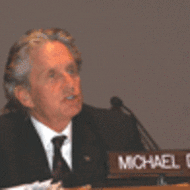Panel event organized by the Global Security Institute, the UN Office for Disarmament Affairs, and the Pugwash Conferences on Science and World AffairsMay 7, 2009by Jim Wurst, MPI Program DirectorThe May 7 panel “Voices of Experience” lived up to its title with presentations by UN High Representative for Disarmament Affairs, Mr. Sergio Duarte, and two former Under-Secretaries-General for Disarmament, Ambassadors Nobuyasu Abe and Jayantha Dhanapala, and UN Messenger of Peace Mr. Michael Douglas. The panelists conveyed a new optimism – cautiously – that the long and short-term goals of the NPT could now be more vigorously advanced.
Mr. Jonathan Granoff, the President of GSI, led off the event recalling that in 2000 with the adoption of the 13 Practical Steps, people thought “surely this would be a roadmap to success, but… we did not realize that it could be washed away, and it almost was washed away. But it was not washed away. Those steps still remain before us and they will be fulfilled. You will succeed, but this is a time to be bold and to seize the opportunity.” Mr. Douglas picked up on the same theme, saying, “We have this moment and it appears we have historical expectations. We have reached a moment of opportunity where the world’s most eminent elders and leaders of the left, the right, and the center have been coming out in a cascade of statements calling for an end to this unacceptable risk. Leaders throughout the world have become part of a chorus of voices of experience resonating with one clear message.” He continued, “So this is a moment where we can feel the rush of that political will beginning to grow and I do not think it is any time for hesitation, cynicism, or doubt. It is a moment to be brave and bold…You are the people tasked with making this happen. With all of my heart, I do hope that this is the moment that we have all been waiting for.” High Representative Sergio Duarte said the UN is “where hope for a better world never dies, and where experience teaches that success requires persistence, a willingness to cooperate with others, and a deep appreciation of mutual interest.” Drawing on the long history of the UN’s involvement in promoting disarmament, Mr. Duarte dealt with the latest initiative in this legacy- Secretary-General Ban Ki-moon’s speech from October saying that a nuclear weapons-free world would be “a global public good of the highest order.” The five-point plan he laid out “place(s) a heavy emphasis on the importance of strengthening the international rule of law as it applies to disarmament,” said Mr. Duarte, “I believe quite strongly that the fate of the Secretary-General’s initiative will be determined by the same factors of persistence, cooperation, and common interest… Some of this collective determination will flow from the actions of inspired leaders of countries or collaboration among groups of states. Yes, in the end, it is the understanding and support from individuals and groups in civil society that supplies the best explanation for the sheer persistence of disarmament.” There was broad agreement on the immediate steps needed to advance the agenda, including the entry-into-force of the Comprehensive Test Ban Treaty (CTBT), negotiations on a verifiable Fissile Materials Cut-Off Treaty (FMCT), and a new US-Russian treaty further cutting strategic weapons. Not surprisingly, President Obama’s April 5th speech in Prague was referenced frequently during the session. Amb. Jayantha Dhanapala said it “represents a major breakthrough in the US policy regarding the nuclear weapon” and lauded the new administration’s appointees whose job it will be to implement that vision. He said the speech contained “many promises” including the CTBT, FMCT, strategic arms negotiations and the importance of the NPT. Likewise, Amb. Nobuyasu Abe said, “We cannot fail to seize the momentum now generated and cannot afford to let it fail to reach the ultimate goal.” Amb. Dhanapala said the problem with the NPT “is that it attempts unsuccessfully to fuse the ban on non-nuclear weapons states acquiring nuclear weapons, with arms control for those who have the nuclear weapons. Unless they fuse, the disarmament aspect with arms control aspect in Article Six, I do not think that the Nuclear Non-Proliferation Treaty can be a sustainable treaty.” He warned that “the struggle against the vision of the nuclear weapons-free world will not be easy. We have to be aware that we have a number of obstacles. We have to be aware of the number of challenges that lie ahead and in this, the role of the civil society is vital, to reboot the system and to ensure the support of the Obama policies.” Amb. Abe, who is now an advisor to the International Commission on Nuclear Non-proliferation and Disarmament (ICNND), said the commission is designed “to re-energize at a high political level the debate about the need for a nuclear weapons-free world in the run-up to the 2010 NPT Review Conference and beyond and to draw a plan for nuclear disarmament that is realistic and practical enough to be able to persuade policy makers to buy the plan.” It follows then that the “immediate priority” will be to “help make the 2010 NPT Review Conference a success.” The next steps must include the CTBT, a successor treaty to START, and reductions by the US and Russia down to levels “so that all the nuclear weapon states may start a collective process of nuclear reduction towards a vantage point from where the world starts the final stage of nuclear elimination.” He said the ICNND is interested in a process that would bring in all nuclear weapon states – NPT states parties and those outside the treaty. “One answer I would suggest is to start involving all those who possess nuclear weapons, irrespective of their standing vis-à-vis the NPT or any other legal or political framework.” To this end, Amb. Abe said the Commission will be developing “a kind of list of homework for each one of those nuclear possessors.” Speaking from the floor, Senator Douglas Roche, the Chairman Emeritus of MPI, said the arrival of President Obama was “a transformational moment not seen since fall of Berlin Wall.” He said this called for “a whole new way to look at nuclear weapons” requiring supporters to find ways to get the message to the people so garner an outpouring of support from the public and like-minded states. The panel was hosted by the Office for Disarmament Affairs, the Pugwash Conferences on Science and World Affairs, and the Global Security Institute.
|







